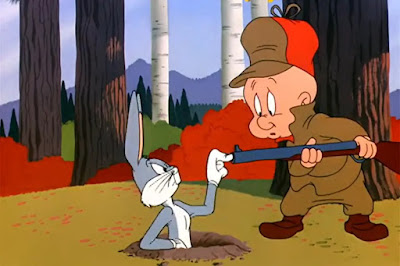But these shows aren't just funny. They're also smart. Prestigious. Groundbreaking in a whole host of ways. And they have a lot to say about, well, stuff.
"I know funny"
Mrs. Maisel is definitely one of those shows with something to say. A lot of ink (pixels?) have been spilled about its portrayal of feminism, especially with regards to Midge Maisel's struggle to find her place in a male-dominated field. And that's wonderful. But I also love what it has to say about making comedy.
All through the first four seasons, we watched Midge slowly build her career around a new concept in stand-up: making the jokes about your own life, in your own voice, about your own experiences.
But Midge's career took a significant detour in season five, episode two ("It's a Man, Man, Man, Man, Man World") when she lands a gig as a staff writer for Gordon Ford, a Jack Paar-like talk show host.
At first, she struggles to switch her comedy style from personal anecdotes to topical gags, but before long, she comes up with what she's convinced is a sure-fire hit and she pitches it to the other writers:
MIDGE: There's going to be a baby in the White House, little JFK, Jr. It'll be a clean transition. White House staff already learned how to change diapers with Eisenhower.ALVIN: "A" for effort. Cec?MIDGE: Oh, now wait a minute.ALVIN: Yeah?MIDGE: I'm sorry, but that last one was funny.ADAM: No, it wasn't.MIDGE: Yes, it was.MEL: No one laughed.MIDGE: I think the audience would, and it's topical. He wants topical.CECIL: A joke is not funny just because you say it's funny.MIDGE: No, it's not funny because I say it's funny. It's funny because it's funny.MEL: And you know funny?MIDGE: Yeah, I know funny.
Those last couple lines of dialogue don't capture the mounting hostility between Midge and the other writers. But it was definitely there. And that's where Midge was wrong.
Not because the joke isn't funny. I think it is. Midge is wrong because she "knows" it's funny.
Humor is the most subjective thing in the world. Whether something is funny depends on a thousand variables. The flow of the joke. The timing of its delivery. The person delivering it. The time period in which it's told. Recent current events (nothing was funny immediately after September 11). And perhaps most of all, who it's being delivered to. and the identity and mood of the people.
Because of all of these variables, nobody--not even an experienced comic--can know whether a joke is funny. You have to test it out, and then see if people laugh. If they do, it's funny. If they don't, then it's not, at least not in that time and place.
The wrong joke
A perfect example of this is a joke she wrote in episode three, "Typos and Torsos." Here she came up with another joke, and it became the first of hers to make it to air:
"Mel Blanc, the voice of Bugs Bunny, was recently in a car accident. He's recovering nicely, though authorities are still questioning the voice of Elmer Fudd."
This one doesn't work at all. Why? Because Elmer Fudd's unique speech habits aren't primarily noted for being slow. They're noted because of his speech impediment--that whole "wascaly wabbit" thing.
A better choice? Porky Pig. His stammer made him take forever to finish a sentence.
Gordon seems to have agreed that the joke didn't work, because he purposely fumbled it during his monologue. After the show, Midge confronts him about it.
MIDGE: You blew the joke. It's okay.GORDON: I did that on purpose.MIDGE: You blew a perfectly good joke so you could point out to the audience that you blew a perfectly good laugh?GORDON: Yes. They love that. It makes me human, and I got a laugh.MIDGE: Yeah, but it was the wrong laugh.GORDON: A laugh is a laugh. There is no wrong laugh.
Maybe I don't know as much about comedy as an experienced stand-up comic, but I do know that joke was never going to get a laugh. It was the wrong joke.
Flawed heroes
But I don't want be too hard on Midge. The media has been hard enough, with essays and editorials slamming her for everything from being an absentee mom to outing her boss when it was a possible death sentence to do so.
Here's the thing. I don't think series creator Amy Sherman-Palladino intended Midge to be a paragon of virtue or someone we should all seek to emulate. And why do we need her to be? She's deeply flawed, something we've seen a ton of male protagonists be without feeling the need to trash them (Calling Tony Soprano! And Walter White! And Barry Berkman!). But somehow, when the protagonist is a woman, it's cardinal sin to be less than perfect.
No, the whole point about Midge being brash and outspoken and obsessively focused on her career is to show that that's what it took to succeed in a man's world.
In a lot of ways, it still is.




No comments:
Post a Comment